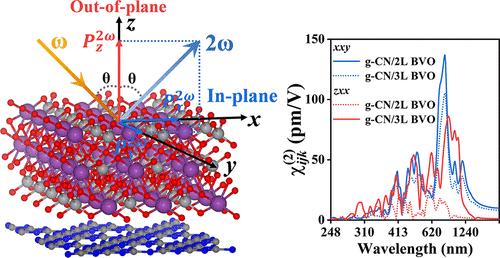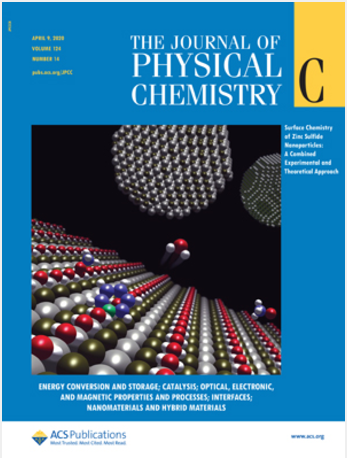Enhanced Anisotropic Second Harmonic Generation in Type-II van der Waals Heterostructures of g-C3N4/BiVO4
IF 3.2
3区 化学
Q2 CHEMISTRY, PHYSICAL
引用次数: 0
Abstract
Due to the remarkably strong second-harmonic generation (SHG), two-dimensional materials have excellent potential applications in nonlinear optics (NLOs). However, their SHG efficiency remains limited due to the short light–matter interaction length. Through van der Waals heterostructure (vdWHS) engineering, it is possible to elongate light–matter interacting length and control structural symmetries and anisotropies. Here, vdWHSs were built by noncentrosymmetric monolayer g-C3N4 and centrosymmetric BiVO4 slabs with varying layers. Their structural stabilities, electronic band structures, band alignments, and SHG susceptibilities have been systematically simulated by DFT calculations. Interestingly, BiVO4 slabs with two or more layers form stable type-II heterostructures with g-C3N4, exhibiting the interlayer separation of photogenerated carriers. Besides, vdWHSs broke the centrosymmetry of BiVO4, resulting in remarkable and complex SHG responses. The in-plane SHG susceptibility of g-C3N4/BiVO4 vdWHSs exceeds 100 pm/V in the 700–800 nm range and gradually decreases as the thickness increases. Significant polarized out-of-plane SHG was introduced by vdWHS. The χzxx(2), χzxy(2), and χzyy(2) components show multiple high peaks at 400–780 and 780–1240 nm, with intensities 3 times larger than that of LiNbO3. These indicate that such vdWHS composites hold considerable potential for NLO in both visible and infrared light regions, which are important for advanced optical communication and photonic computing systems.

g-C3N4/BiVO4 的 II 型范德华异质结构中增强的各向异性二次谐波生成
由于具有极强的二次谐波发生(SHG)能力,二维材料在非线性光学(NLO)领域具有极佳的应用潜力。然而,由于光-物质相互作用长度较短,它们的 SHG 效率仍然有限。通过范德华异质结构(vdWHS)工程,可以延长光物质相互作用长度,控制结构对称性和各向异性。在这里,范德华异质结构是由非中心对称单层 g-C3N4 和具有不同层的中心对称 BiVO4 板建成的。我们通过 DFT 计算系统地模拟了它们的结构稳定性、电子带结构、带排列和 SHG 感度。有趣的是,具有两层或更多层的 BiVO4 板与 g-C3N4 形成了稳定的 II 型异质结构,显示了光生载流子的层间分离。此外,vdWHS 打破了 BiVO4 的中心对称性,从而产生了显著而复杂的 SHG 响应。g-C3N4/BiVO4 vdWHS 的面内 SHG 感度在 700-800 纳米范围内超过 100 pm/V,并随着厚度的增加而逐渐降低。vdWHS 带来了显著的极化面外 SHG。χzxx(2)、χzxy(2)和χzyy(2)分量在 400-780 纳米和 780-1240 纳米处显示出多个高峰,其强度是 LiNbO3 的 3 倍。这表明这种 vdWHS 复合材料在可见光和红外光区的 NLO 方面具有相当大的潜力,而这对于先进的光通信和光子计算系统非常重要。
本文章由计算机程序翻译,如有差异,请以英文原文为准。
求助全文
约1分钟内获得全文
求助全文
来源期刊

The Journal of Physical Chemistry C
化学-材料科学:综合
CiteScore
6.50
自引率
8.10%
发文量
2047
审稿时长
1.8 months
期刊介绍:
The Journal of Physical Chemistry A/B/C is devoted to reporting new and original experimental and theoretical basic research of interest to physical chemists, biophysical chemists, and chemical physicists.
 求助内容:
求助内容: 应助结果提醒方式:
应助结果提醒方式:


